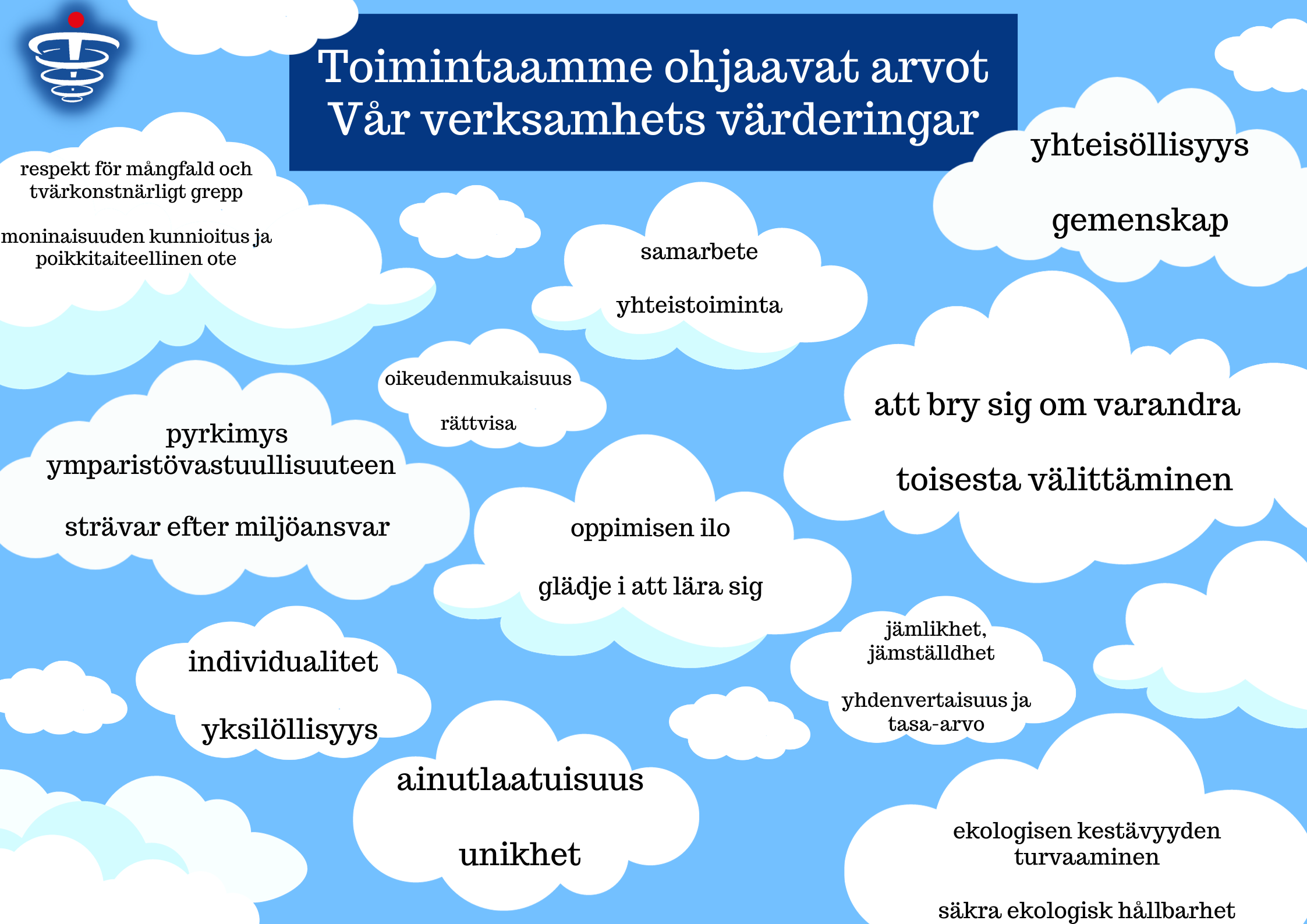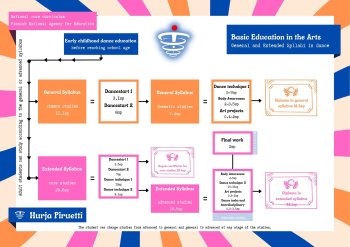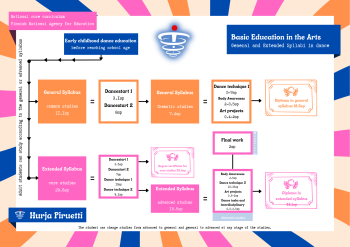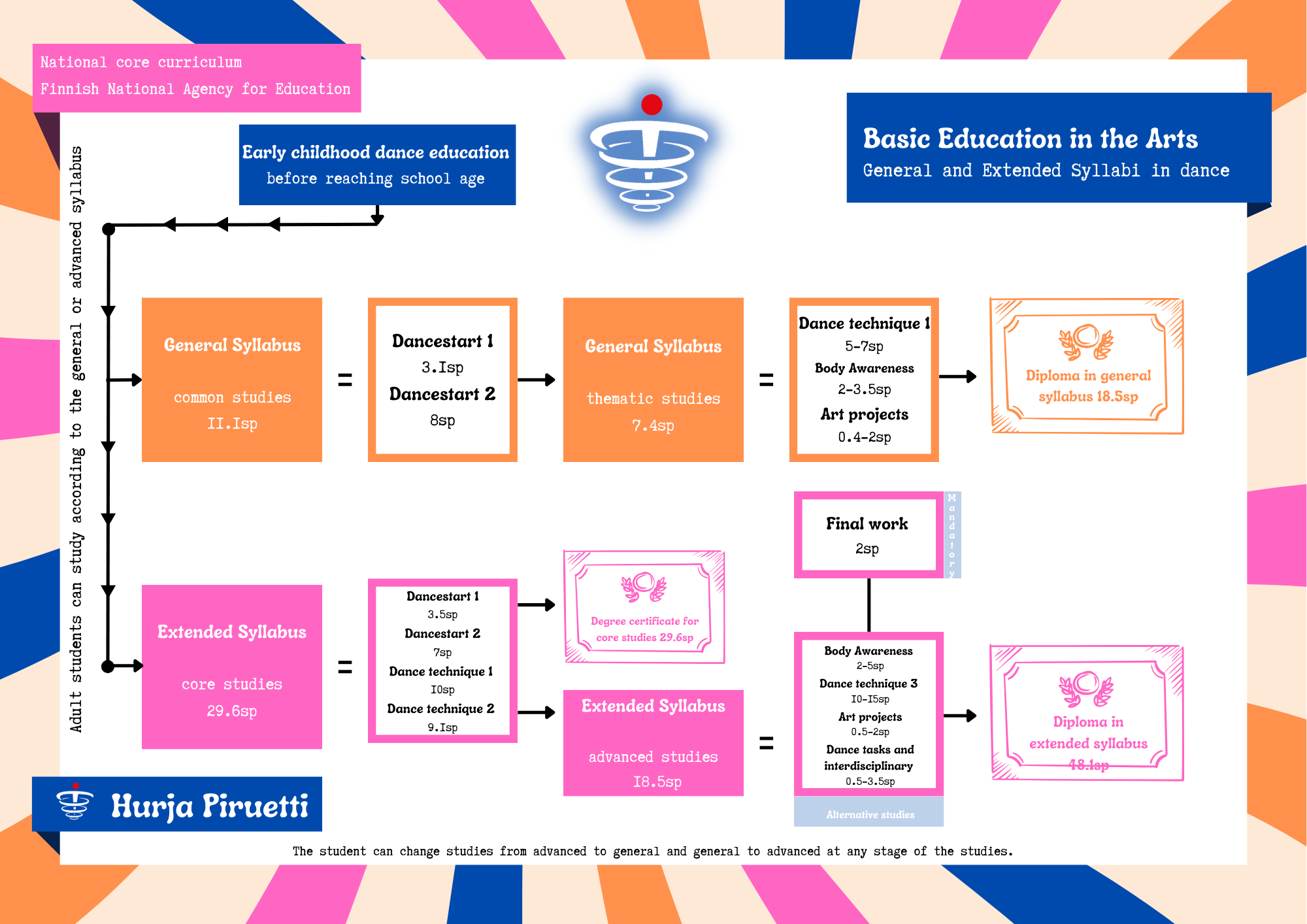Goal-directed and professional education
Studies in different subjects and on all levels is goal-directed and based on style specific curriculum. The means in the institute's educational work and other activities are self evaluation, constant work with the curriculum, participation in the discussion regarding basic education in the art of dance, and international relations and projects.

Our objectives are...
- To help the student build a positive relationship with dance as a form of sports and art
- Create a solid base for long-term and lifelong activity
- Offer the student adept knowledge and skills in dance
- Support the growth of the student's own creativity and social skills
- Develop the student's capability of long-term and goal-directed working
- To raise human beings who respect and understand culture
- To support the student as a part of our diverse community
- Diversity manifests in our work for example in the bilingual education we provide for all age groups
- To create a solid base for further studies in the field
- To develop the local, regional, national and international relations and collaboration

The General Syllabus In Dance
The calculated extent of studies in dance according to the general syllabus is 18.5 study points. The studies in the general syllabus consist of common studies (11.1 study points) and thematic studies (7.4 study points). The purpose of the common studies is to develop the basic dance skills. In the education, each student’s individual strengths, openness to learning, starting point and cultural background are taken into consideration, so that each one has the same possibility to feel included in relation to the content and offer of the classes, regardless of, for example, gender or ethnicity.
The purpose of the thematic studies is to expand the knowledge and skills acquired during the common studies. In the education, each student’s strengths and interests, the institute’s resources, current phenomena and the region’s demographic and cultural progress are taken into consideration. We offer our students alternative modules for the thematic studies. If possible, the common studies should be completed in order.
The student’s studies can exceed the calculated amount. The studies are primarily designed to be completed in order. The students are expected to attend classes consistently, and to commit to complete the chosen courses and studies.
The student may choose whichever of the dance styles offered and progress within that specific style, or choose to study several styles according to our curriculum. This means that the study modules can be composed of either progressing within one genre or within a combination of various dance styles. The study modules can also be executed in the form of workshops or camps organised by the institute.
The study modules can be chosen according to the selection of suitable dance classes offered during the season. If the needed skills have been acquired in some other way, the modules can be completed without undertaking studies on the previous level. In general, the basic education can be completed in 6 years by attending one weekly class for the first five years, and 2x60min/week during the last year of studies.
The calculatory extent of the basic education in the art of dance is altogether a minimum of 18.5 study points (one class is the equivalent of 45min).

The Extended Syllabus In Dance
Dance studies in the extended syllabus consist of core and advanced studies, and of possible early childhood studies. The purpose of the core studies is to guarantee a goal-orientated and consistent development of the key skills in terms of the art form. The purpose of the advanced studies is to broaden the study possibilities, or to focus on some of the already existing ones.
The extent of the core and advanced studies altogether is a minimum of 48.1 study points (one class is calculated as 45 minutes). The calculated extent of core studies in the extended syllabus is 29.6 study points. In the advanced studies, the amount is 18.5 study points. Here, the calculated extent means that the student gets a study credit for the module once they have reached the module’s set goals and completed the given contents. Hence, the student’s studies can exceed the calculated amount. The studies are primarily designed to be completed in order. The students are expected to attend classes consistently, and to commit to complete the chosen courses and studies.
The extended syllabus of the basic education in the arts constitutes of core and advanced studies. Everyone under the age of 10 are automatically undertaking studies according to the extended syllabus. At the age of 10 a decision regarding the main and minor subjects is made.
Structure of the education:
- Core studies, carried out in approximately 6 years (8-13yo)
- Advanced studies, carried out in approximately 6 years (14-20yo)
The core and advanced studies make up altogether a minimum of 48.1 study points (here, one class is equvalent of 45min). Out of this, the core studies make up 29.6 studie points, and the advanced studies 18.5 studie points.
The General Syllabus In Circus arts
The general syllabus in circus is made up of common studies (11,5 study points) and thematic studies (8,5 study points). The general syllabus has no major or minor subjects. The student can choose one or more circus lessons or acrobatics in our range and advance according to the curriculum. A study module consists of a lesson during one academic year. For example, a circus lesson once a week during the autumn and spring semesters forms a study module. By participating in several lessons each week, the student can complete several study modules during one and the same year, for example one class of each in acrobatics, stand on hands lessons and the circus provides three study modules.
The studies according to the general syllbaus in circus can consist of several different, from level to level progressing, study modules within one and the same genre or of combinations of different study modules. Study modules can also be taken at the institute's camp or other workshops.
On average, basic studies in circus can be taken through 1 hour a week for five years and then during the sixth year 2 x 60 min lesson / week as an example. The general syllabys in circus has an estimated scope of a total of 20 study points. A 45-minute lesson has been used as a calculation basis.


